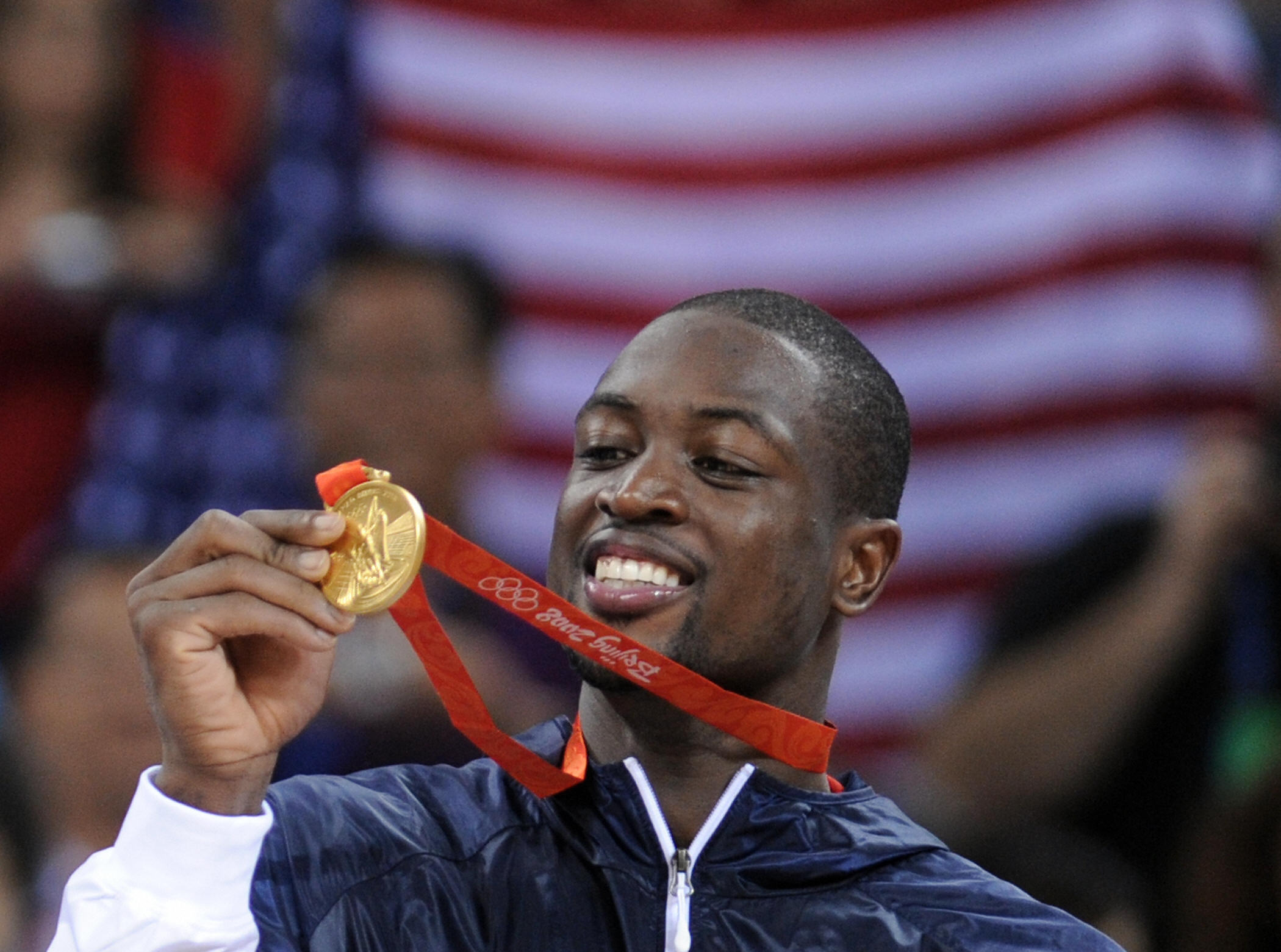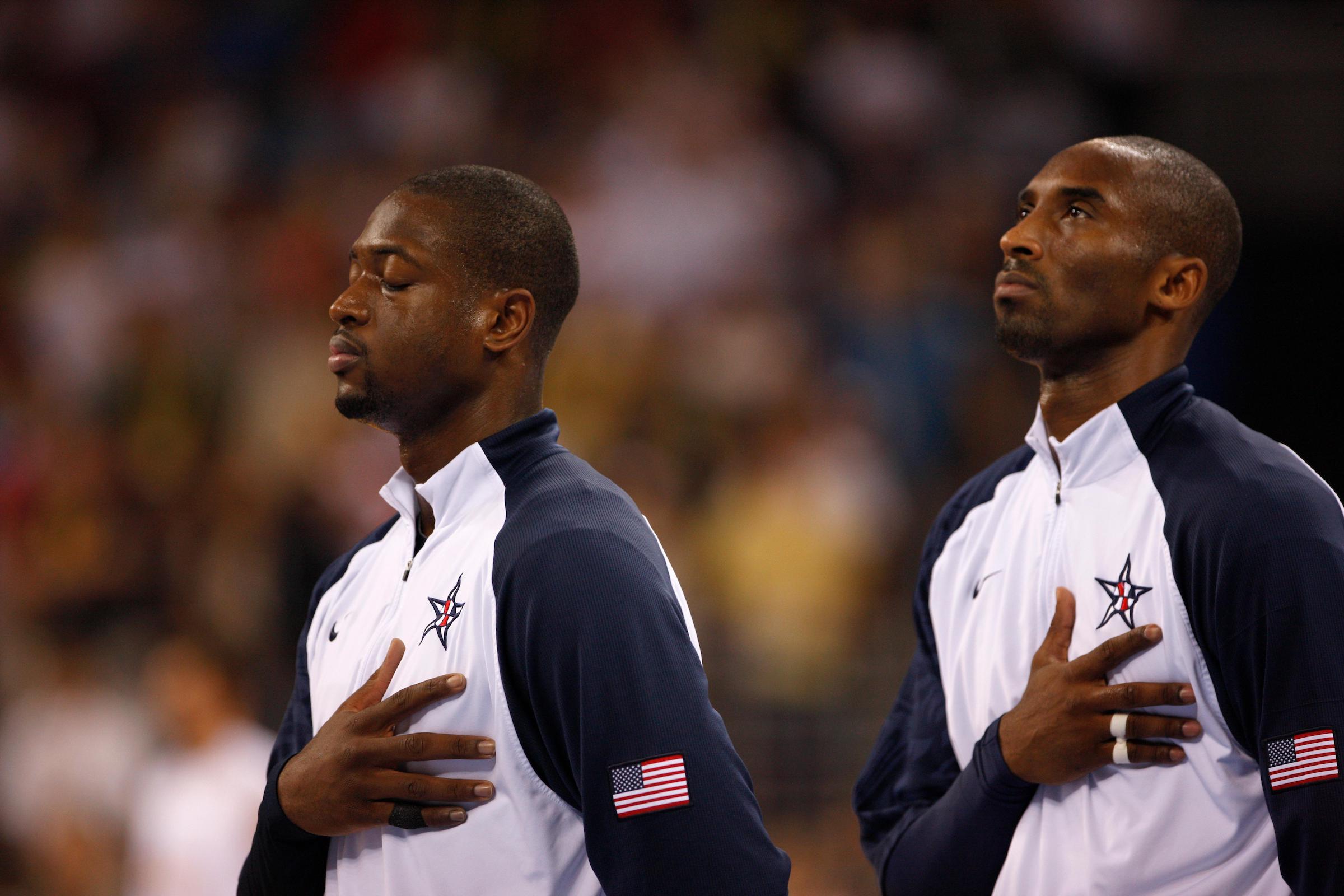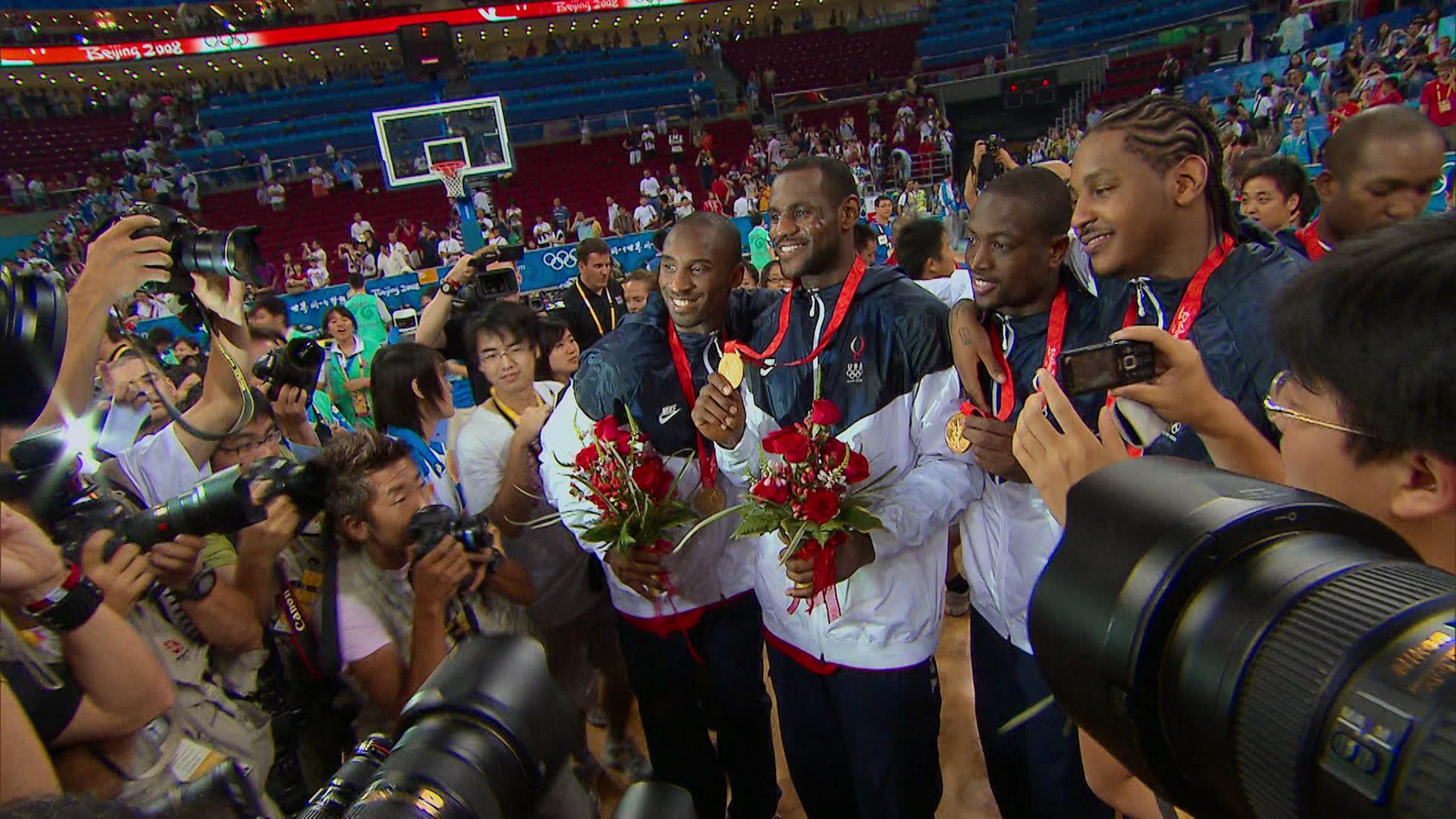
On Aug. 15, 2004, the United States suffered sports humiliation, on the most global of stages. At the Athens Olympics, Puerto Rico trounced the American men’s basketball team, 92-73, the preliminary round opener. For the first time, the U.S. men’s team lost in Olympic competition while suiting up NBA players; pros like Michael Jordan, Larry Bird and Magic Johnson first played in the Olympics in 1992, for the Dream Team. A dozen years later, the likes of Tim Duncan, Allen Iverson, and Stephon Marbury—and a very young LeBron James, Dwyane Wade, and Carmelo Anthony— were getting blown out.
The U.S. would lose two more games—to Lithuania and Argentina—during that Olympic tournament, and finish with a bronze. After that embarrassment, USA Basketball reformed its men’s national program. Jerry Colangelo took over as managing director, Mike Krzyzewski became coach, and they set out building a true national team. Kobe Bryant, James, Wade, and other stars bought in: their request to reclaim the gold medal during the 2008 Beijing Olympics is the subject of a new documentary, The Redeem Team, now streaming on Netflix.
TIME caught up with Wade, a key member of that ’08 Olympic squad and currently a minority owner of the Utah Jazz, to talk about the film, standout moments from the Redeem Team’s path to gold, and the latest basketball sensation: French teenager Victor Webanyama, who shined in recent games while playing in the U.S. and is sure to be the top selection in next year’s NBA Draft.
Not to pick on the 2004 Olympic team, but that experience was formative: the Redeem Team was looking to avenge the poor performance in Athens. What was the low moment for you in 2004?
Wade: I was just talking about this with Melo [Carmelo Anthony] last night at a screening. Just getting the bronze medal and watching Argentina celebrate. Just seeing the joy. That was a happiness and a joy that you really don’t get to see. These guys grew up together. You realize how much it meant. And so I remember. It’s in my brain, watching them celebrate and jump around. It hurts so bad.
That moment for me will never go away. Even now. We won [in 2008]. But I still remember that moment. It meant more to them. We watched that and were like, OK, I want to feel that.
Back in 2008, we did a Redeem Team cover story, focused on LeBron James. I asked both you and Kobe Bryant to describe LeBron’s personality. You both replied: “Loud.” Does an example stand out, from that time, of LeBron’s volume?
It comes across in small moments in the documentary. I think people have to understand too, when you watch the doc, you’re looking at one point a 19-year-old LeBron, and at another point, a 22-year-old LeBron. This is a young, young guy. You watch his vocalness on the court, how he talks to his guys, how he talks to his teammates … people don’t do that. People don’t really talk on the court. They just play.
He’s a conductor, right? At a young age. He never shut up, which is great. And then off the court. Like he said in the doc, Kobe needs to laugh too. He likes to have fun. He wants to be accepted. So he does a great job in the Olympics of knowing how to use his comedic timing and his jokes. He always took those moments, any time it was quiet, to crack jokes. Do starting lineups in other voices. Whether he was on the floor or on the bench on the bus, he was just always going at that time. I’m sure he’s way different now, as he gets older. But when he was young, he just had that motor.

Another striking moment of the documentary was seeing the joint interviews of LeBron and Kobe Bryant from that time. What goes through your mind emotionally now when you see them together?
You’re looking at two guys who are polar opposites. They could not be more opposite, in a lot of ways. But the similarity is the greatness that they both have inside. The demand on themselves to be great, which demands the ones around them, if they have it, to be great.
There’s more than one way to do it. It’s not just Kob’s way, it’s not just Bron’s way. There’s many ways to get to the success that you crave for yourself and for your teammates. I remember being there when they were going to do that interview. You’ve got to understand, they didn’t have a lot of interaction outside of being competitors at that time. And there was a lot of talk back then of who was better, the young LeBron or the older Kobe. None of us had seen the interview. It wasn’t like they came to show us. I think a lot of people’s first time seeing this is going to be now.
It was one of those moments where we were all like, man, we all hope it goes as it should. Not that they had any beef. It was what the media was building up. We know the competitor that Kobe is. We know what Bron is trying to accomplish. And a lot of it is you’ve got to throw that guy off his throne to be called the best in the game. That’s what I look at when I see that interview.
The film also covers your personal journey on this team: you were hurt in the lead-up to the Olympics. There were questions about whether you could rehab in time to play. Why did you push yourself so hard here?
Because of ’04. I was a part of it now. And in ’06, we lost again, in Worlds in Japan. I took some hard Ls back to the States. It was embarrassing.
It’s one thing to lose in the NBA Finals. It’s OK to lose to Dirk [Nowitzki], to Jason Kidd and all those guys. But when you’re losing to guys who no one knows, these are faceless players to a lot of people. It has an embarrassing effect. And now in 2007 I was injured, I’m there in Vegas, I’m watching the team [in Olympic qualifying] and I see them win and I’m happy for them. But now I’m starting to feel a little left out.
I worked my butt off to be a part of the team because I wanted to win a gold medal. I wanted to redeem us as a team, but also at that time of my life, I wanted redemption for myself. A lot of people said it was over for me. They said I was going to have the injuries that Anfernee Hardaway had. Or even though he had a great career, T-Mac [Tracy McGrady] got hit with injuries, and they were saying I was going to be that guy. I needed to go out and tell a different story.
There has always been talk, in basketball circles, about Mike Krzyzewski liking to curse. The documentary showed he wasn’t afraid to throw some F-bombs around. Did his proclivity for foul language surprise you?
[Laughs]. In the words of Coach K, it surprised the f-ck out of me.
I didn’t know. I shouldn’t have been surprised. I’ve been around coaches my whole life. When you’re in competition, you’re not looking for the right word. You’re looking for the word is going to put the emphasis on something. Coach K, he was dropping them. And I was just like, “Oh, I like this guy.” He was just being himself. I think it was because we didn’t know a lot about Coach K. You see the wins, the smile, the bowl cut when he was younger. Then I got to experience the man, and the man is intense. And so it was a little surprising, but it was a welcome surprise, coming from an intense organization like I came from.

Another surprise from the documentary was Kobe Bryant absolutely pummeling his then-LA Lakers teammate, Pau Gasol, on a screen in a preliminary round game against Spain. I had forgotten all about that. How did Kobe not get ejected?
They actually let you get very physical in an overseas play. That’s one thing that shocked me when I first got over there. Because you hear this notion that overseas players are soft. You realize once you get over there, they’re not soft but very skilled. I got away with a couple of hits. And people got away with a couple of hits on me over the years. It was different play. And Kobe knew it. In that game, because it wasn’t a gold medal game, I don’t even think he thought about that, or cared. He was trying to send a statement. We are coming for you. He was showing us that that’s not my brother. Y’all my brothers.
Do you have a favorite behind-the-scenes story from your time with the Redeem Team?
It’s going to be a little selfish. I never really talk about it a lot. I was coming off injuries, but I was a star in the league. At the time, felt like I was one of the top three players in the league, with LeBron and Kobe. And so one of the moments that was important to me, and it showed a lot about our team, was when Coach K and I talked about me coming off the bench. I still was the third-best player on the team. And arguably, in some moments, I thought I was one.
Kobe came to me right after a practice. I wasn’t down. I just was like, I’ve got to figure this out. Coming off the bench, how am I going to do this? Kobe came to me and he said, All right, so when we’re in the game together—and he just totally went past me coming off the bench—he was like, yo, when me and you are playing together, I’m going to pick up 94 feet. And when I pick up, I’m going to turn my guy, and I want you to come through the passing lanes. And if you watch any of that, you will see me running through passing lanes for steals. And a lot of it was ’cause Kob let me know.
Think about it. He’s the champion. He’s the 30-year-old. I’m the younger one. He knew my strength. And he allowed my strength to shine, knowing that I was coming off the bench. So that gave me so much confidence. That’s one of my favorite stories that I never really talk about a lot. That’s leadership.
And that talk paid off: in the gold medal game against Spain, you scored 27 points coming off the bench, helping the team to a 118-107 victory. Really quick before you go—have you gotten to see the 18-year-old sensation from France, Victor Wembanyama? What do you think of him?
I don’t know how much I can comment on Victor, because I’m an NBA owner. Obviously we all are fans, and everyone loves the potential of these young guys and everything, but I don’t know how much I can comment.
I see. So I can’t ask you about Utah’s interest in him, wink wink.
The whole league has interest in, what did ‘Bron call him, an alien?
Yes, an alien.
Why wouldn’t everyone have interest in him? And obviously the teams that are going to have the best chance [to get him] are going to be the teams that aren’t as good as the Golden State Warriors, right? But everyone has interest in something we’ve never seen.
More Must-Reads from TIME
- Cybersecurity Experts Are Sounding the Alarm on DOGE
- Meet the 2025 Women of the Year
- The Harsh Truth About Disability Inclusion
- Why Do More Young Adults Have Cancer?
- Colman Domingo Leads With Radical Love
- How to Get Better at Doing Things Alone
- Michelle Zauner Stares Down the Darkness
Write to Sean Gregory at sean.gregory@time.com